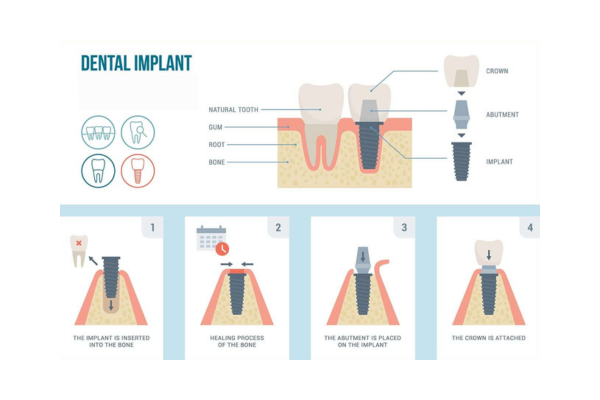Feeling anxious before dental implant surgery is a common occurrence and entirely understandable. However, it’s crucial to acknowledge that there’s no reason to be afraid of the procedure, particularly when it’s performed by a proficient and experienced implant dentist who employs state of the art sedation and technology. Utilizing these modern resources can make your treatment a comfortable and stress free experience, effectively alleviating any anxiety you may have.
What are dental Implants?

Dental implants are medical devices surgically placed into the jawbone to help restore the functionality and appearance of a person’s teeth. They act as a sturdy foundation for various types of artificial teeth, including crowns, bridges, or dentures. By providing a durable and reliable support system, dental implants can help individuals regain their ability to chew and maintain a confident smile.
Seven potential complications to be aware of when considering dental implants
- Loose Implant: The most frequently encountered complication is a loose implant.
- Infection: Infection is another common risk associated with dental implants.
- Bleeding: Bleeding may also occur following the procedure.
- Micro-movement: Micro-movements can hinder the implant’s stability and success rate.
- Allergic Reaction: Some individuals may be allergic to the implant material.
- Nerve Damage: Nerve damage is a rare but possible complication that can cause discomfort or numbness.
- Protrusion into the Sinus Cavity: In certain cases, the implant may protrude into the sinus cavity, leading to inflammation or infection.
8 signs you may need a dental implant
- Missing one or more teeth
- Loose or uncomfortable dentures, partials, or bridges
- Tooth extraction
- An aged facial appearance due to missing teeth
- Tired of dealing with messy and inconvenient denture adhesives
- Cracked or broken teeth
- Feeling insecure about your smile
- Trouble chewing food
8 reasons Why you shouldn’t be afraid of Dental implant
Local Anesthesia
One of the main reasons people are afraid of dental procedures is the fear of pain. However, local anesthesia is used with dental implants to numb the area around the implant site. It means you will not feel any pain during the procedure.
Modern techniques are designed to minimize discomfort.
Dental implant technology has come a long way in recent years. Today’s techniques are designed to minimize discomfort during and after the procedure. It includes using smaller incisions, specialized tools, and advanced imaging technology to ensure precise placement.
Rest assured that your dentist is highly skilled and experienced.
Dental implant placement requires extensive training and experience. Your dentist has undergone specialized training and has the expertise to ensure a successful procedure. It means you can trust that your dentist knows what he or she is doing.
Confidently Smile During Implant Healing
While traditional dentures can take weeks or even months to heal, dental implants can be made to look presentable almost immediately. It is because the crown or bridge attached to the implant can be made before the procedure.
The Implants Will Not React Once They Are In
Dental implant are made from biocompatible materials, so they will not react negatively with your body. It reduces the risk of complications and increases the procedure’s success rate.
High Success Rate
Dental implants have a very high success rate. Studies have shown that the success rate for dental implants is around 95%. It means you can trust that your dental implant will be successful and provide a long-term solution to your missing tooth.
Your investment in implants is valuable.
While dental implants may be more expensive than other tooth replacement options, they are a worth while investment. They offer a long-term solution to missing teeth and can improve your quality of life by allowing you to eat, speak, and smile confidently.
Implants Feel and Look Natural.
Since implants are designed to match your natural teeth’ size, shape, and colour, they can blend in perfectly and be difficult to tell apart from real teeth. Additionally, they are made to feel like natural teeth and lack any sharp edges that can make it difficult to eat or drink due to their smooth surface. Implants may offer a comfortable and worry free experience with such attention to detail, enabling you to enjoy your meals and beverages without discomfort.
How are dental implants done?

The placement of a dental implant is a multi step process that can take several months to complete. It involves the removal of any damaged teeth, followed by preparing the jawbone, if necessary, through grafting. Then the actual dental implant is placed into the jawbone. After the implant is placed, the bone needs to heal and grow around the implant, a process that can take several months.
Once the bone has sufficiently grown, the abutment is placed on the implant, which connects the implant to the artificial tooth. Finally, the artificial tooth, a dental crown, is placed onto the abutment.
Throughout the process, patients may need multiple visits to their dentist or oral surgeon to ensure that the implant is healing correctly and that the artificial tooth fits properly. While the process can take time and may require some patience, the result is a permanent, durable replacement for missing teeth that can improve a person’s overall oral health and quality of life.
Faqs
How are dental implants made?
Dental implants are typically made from titanium and alloys, with Ti-6Al-4V being the most commonly used alloy. These highly biocompatible materials offer excellent mechanical strength, making them the ideal choice for dental implants. However, certain prosthetic components of the implants, such as abutments and connectors, may still be made from other materials, such as gold alloys, stainless steel, and cobalt chromium and nickel-chromium alloys, depending on the specific requirements of the patient’s case.
Are implants stronger than real teeth?
Regarding restorative dentistry, dental professionals often note that implants can be stronger than our natural teeth. In addition to their durability, implants have the advantage of looking and feeling entirely natural, with a skilled dentist ensuring a precise fit.
Are most people happy with dental implants?
Most individuals who have undergone dental implant procedures report high satisfaction levels. Specifically, 81% report a high level of chewing comfort, and 94% express satisfaction with the appearance of their implant restorations. However, 32% of individuals may encounter problems with their implant reconstructions.



